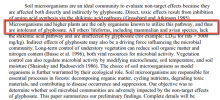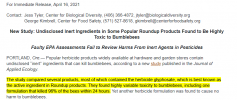Bassattackr
5 year old buck +
I know it's not a popular opinion in our industry but I agree with Dan, it (among other herbicides) have become quite a crutch for many.
How many times have you read... Starting a food plot for beginners - First step, burn down your entire farm with a destructive chemical, killing everything in sight. Ok great! Now you're ready to seed! Please.
There's a rather growing trend among soil biologists that preach "If you're tilling/disking/plowing you're destroying the soil microbiology!". Yet in their podcasts and tv shows, they routinely recommend field burn downs with glyphosate. You know what else kills soil microbiology? You guessed it, Glyphosate! The irony is almost humorous.
While the (potentially carcinogenic) affect on humans is debatable, increasing number of studies are coming out regarding blanket herbicide spraying and their affects on predator/ prey insect populations, honeybees & other pollinators, soil microbes, turkey poults... Essentially affecting the entire ecosystem as a whole. As I've touched on before/above, I'm not a fan of blanket spraying fields for burndowns or weed control. Spot spraying invasive plants like Sericea lespedeza, multifloral rose? Yes I would. Only option in some scenarios and much more limited exposure/impact.. I don't subscribe to the "You're a lousy steward of the land if you use herbicides!" ideology but I do think we as property managers are too reliant on them, and they do have much greater affects, and farther reaches than we realize.
How many times have you read... Starting a food plot for beginners - First step, burn down your entire farm with a destructive chemical, killing everything in sight. Ok great! Now you're ready to seed! Please.
There's a rather growing trend among soil biologists that preach "If you're tilling/disking/plowing you're destroying the soil microbiology!". Yet in their podcasts and tv shows, they routinely recommend field burn downs with glyphosate. You know what else kills soil microbiology? You guessed it, Glyphosate! The irony is almost humorous.
While the (potentially carcinogenic) affect on humans is debatable, increasing number of studies are coming out regarding blanket herbicide spraying and their affects on predator/ prey insect populations, honeybees & other pollinators, soil microbes, turkey poults... Essentially affecting the entire ecosystem as a whole. As I've touched on before/above, I'm not a fan of blanket spraying fields for burndowns or weed control. Spot spraying invasive plants like Sericea lespedeza, multifloral rose? Yes I would. Only option in some scenarios and much more limited exposure/impact.. I don't subscribe to the "You're a lousy steward of the land if you use herbicides!" ideology but I do think we as property managers are too reliant on them, and they do have much greater affects, and farther reaches than we realize.




